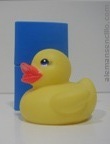
Prepositions in German
Use of Prepositions in German: Prepositions are used as a union between a noun, verb or adjective with another noun, verb, adjective or adverb. The use of one preposition determines the case used for nouns, articles, adjectives and pronouns.| Accusative | Accusative/Dative | Dative | Genitive |
|
an auf hinter in neben über unter vor zwischen |
|
|
Prepositions with Accusative
- bis
- durch
- für
- gegen
- ohne
- um
- wider
bis
- until (LOCATIVE or TEMPORAL)
bis bald (see you soon)
bis in den Tod
von Kopf bis Fuß (from head to toe)
durch
- by means of, through (LOCATIVE)
Eine Reise durch Deutschland (a trip through Germany)
Wir fahren durch den Fluss (we are driving through the river)
10 [geteilt] durch 5 ist gleich 2 (10 divided by 5 is 2)
Used in the construction of the passive voice:Google wird durch Werbung finanziert (Google is financed by advertisements)
Important verbs followed by the preposition durch:waten durch (to wade through)
für
- for (PURPOSE)
sterben für dich (to die for you)
- of (PURPOSE)
Institut für Allgemeine Physik (Institute of General Physics)
- abstellen für (to send to)
- adaptieren für (to adapt to/for)
- agitieren für (to campaign for)
- Geld ausgeben für (to spend money for)
- bürgen für (to vouch for)
- einstehen für (to be responsible for something)
- sich entscheiden für (to decide on)
- entschuldigen für (to apologize for)
- interessieren für (to be interested in)
- sorgen für (to take care of something)
- vertauschen für (to change for)
gegen
- against (LOCAL)
Kampf gegen den Krebs (the fight against cancer)
gegen die Wand (against the wall)
- toward, about, approximately (TEMPORAL)
Er kommt gegen 9.00 ins Büro (He’s coming to the office at 9:00) [approximately]
- abdichten gegen (to seal against)
- abhärten gegen (to strengthen against)
- abschirmen gegen (to protect against)
- agitieren gegen (to campaign against)
- protestieren gegen (to protest against)
ohne
- Welt ohne Krieg (a world without war)
um
- at (TEMPORAL)
um zehn Uhr (at ten o’clock)
um ein Haar(very nearly)
- at, around (LOCAL)
um die Ecke (around the corner)
- bitten um (to ask for/ to request)
- kümmern um (to care for)
wider
- against
Er handelt wider das Gesetz (He is acting against the law)
Wider Erwarten kam der Gast doch noch (Against all expectations, the guest arrived)
Prepositions with Dative
- ab
- aus
- außer
- bei
- entgegen
- entsprechend
- mit
- nach
- seit
- von
- zu
ab
- starting at/on (TIME)
ab dem 24. Februar (starting on the 24th of February)
- from (PLACE, ORIGIN)
Wir fliegen ab Köln (we fly from Cologne)
aus
- from (PLACE, origin)
Wein aus Italien (Wine from Italy)
Ich komme aus Spanien (I come from Spain)
Wir kommen aus der Stadt (We come from the city)
- from, out of (MATERIAL)
Tisch aus Holz (Table out of wood)
- auswählen aus (select from)
- bestehen aus (consists of, to be composed of)
- ableiten aus (to derive from)
- kommen aus (to come from)
- vertreiben aus (to expel from)
außer
- without
Außer der Liebe nichts (Nothing else besides love)
Wir sprechen alles außer Hochdeutsch (We speak everything except high German)
- (expressions)
außer Betrieb (out of service)
bei
- next to, near to (PLACE)
Die Schule ist bei der Apotheke (the school is next to the pharmacy)
- in, with, at
Ich arbeite bei Porsche (I work at Porsche)
bei Montage (during assembly)
entgegen
- against, contrary to
entgegen allen Erwartungen (contrary to all expectations)
- (expressions)
entgegen dem Uhrzeigersinn (counter-clockwise)
entsprechend
- according to
entsprechend dieser Regel (according to this rule)
den Umständen entsprechend (according to the circumstances)
mit
- with (MODAL)
Spiel mit mir (Play with me)
Er reist mit dem Fahrrad (He’s traveling with his bike)
- ausrüsten mit (to equip with)
- beginnen mit (to begin with)
- eindecken mit (to supply with)
- hantieren mit (to be busy with, to temper with)
- multiplizieren mit (to multiply by)
- protzen mit (to make a show of)
- rechnen mit (to count on, reckon)
- reden mit (to talk with)
- sprechen mit (to speak with)
- teilen mit (to share with)
- sich treffen mit (to meet with)
- zusammenhängen mit (to be related with)
nach
- to, toward (LOCATIVE)
Sie geht nach Berlin (She’s going to Berlin)
– nach is used for cities or countries that don’t have an article – Expression: nach Hause ([I’m going] home) - to (LOCATIVE)
nach links (to the left)
- after (TEMPORAL)
Sie studiert nach der Arbeit (She studies after work)
seit
- since (TEMPORAL)
Besucher seit 2008 (visitors since 2008)
von
- from, of (LOCATIVE OR TEMPORAL)
das Lied von der Erde (the song from the Earth)
- abbringen von (to dissuade from)
- abhängen von (to depend on)
- ablassen von (to desist from)
- abschreiben von (to copy from)
- abweichen von (to deviate from)
- entbinden von (to absolve from)
- zurücktreten von (to resign from/ to back out of)
Google wurde von 2 Mathematikern gemacht (Google was made by 2 mathematicians)
zu
- towards
er kommt zu mir (he is coming to me)
“Zu” is used with the meaning of to – when we are heading to a person or a specific place (with a name) - on, at, to
Er kommt zu Fuß (He’s coming on foot)
Übergang zu der Demokratie (Transition to democracy)
- (EXPRESSIONS)
Ich bleibe zu Hause (I stay at home)
Der Weg zum Meer (The way to the sea)
Informationen zu Italien (Information on Italy)
Prepositions with Genitive
- anstatt
- aufgrund
- außerhalb
- dank
- statt
- während
- wegen
anstatt
- instead of
Ich will anstatt der Pommes lieber mehr Salat (I want more salad instead of French fries)
aufgrund
- due to, based on
Diskriminierung aufgrund des Glaubens (Discrimination due to beliefs)
außerhalb
- outside of, out of
Außerhalb des Bereichs (Out of the area)
dank
- thanks to
Dank deines Tipps hat es geklappt (It worked thanks to your tip)
statt
- instead of
Sie gab ihren Schmuck statt des Gelds (She gave her jewelry instead of the money)
während
- during
Während des Jahres 2008 (During 2008)
wegen
- because of, due to
Wegen eines Fehlers (Due to a mistake)
- zerstreiten wegen (to quarrel because of)
Prepositions with Accusative/Dative
They are also called “Wechselpräpositionen”. They are accusative if they indicate movement and dative if they indicate a state (of rest).- an
- auf
- hinter
- in
- neben
- über
- unter
- vor
- zwischen
| Verbs of movement (regular and transitive) | Verbs of state (irregular and intransitive) |
|
|
an
- on, in, next to
Wenn ich an deiner Stelle wäre, würde ich … (If I were in your position, I would…)
- (EXPRESSIONS)
Am Sonntag (On Sunday)
Am Abend (in the evening)

auf
- in, about, on
- absetzen auf (to set down on)
- achten auf (to pay attention to)
- achtgeben auf (to look out for)
- anstoßen auf (to toast for)
- antworten auf (to reply to)
- ausweisen auf (to expel from)
- sich freuen auf (to be happy about)
- warten auf (to wait for)
- zielen auf (to aim for)
- zuschießen auf (to hurdle toward)
hinter
- behind
Gehen Sie bitte hinter das Haus (Please go behind the house)

in
- in, inside
- einbauen in (to insert into)
- einbinden in (to include in)
- sich verlieben in (to fall in love with)
- versunken in (to engulfed in)
- zerteilen in (to divide into)
neben
- next to, near
über
- over, about, on top of (but without contact)
- nachdenken über (to think about)
- reden über (to talk about)
unter
- under
Die Ente liegt unter dem Tisch (The duck is under the table)

vor
- in front of
Sie wartet vor der Schule (She is waiting in front of)
- ago
Ich bin vor vier Jahren nach Deutschland gekommen (I arrived in Germany four years ago)

zwischen
- between
Ein Vertrag zwischen Vatikan und der Freien und Hansestadt Hamburg (A contract between the Vatican and the free and Hanseatic city of Hamburg)
